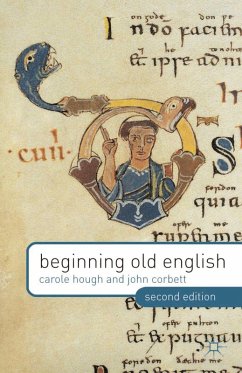This basic introduction to Old English is an essential guide for students with little or no linguistic knowledge. Unlike other textbooks on the subject, Beginning Old English focuses on the explanation and demonstration of how the language works, using accessible illustrations from simplified Old English texts and showing how many features of present-day English have their roots in this stage of the language.
Beginning Old English
- builds up reading skills by using simple texts to support the acquisition of key vocabulary and to develop awareness of language structure
- offers an introduction to the conventions of Old English poetry and how they are realised across different genres: religious verse, riddles, elegies and heroic poetry
- explores issues in the translation of Old English verse
- guides the reader through four major texts: Cynewulf and Cyneheard, Beowulf (extract), The Battle of Maldon and The Dream of the Rood
- features activities, glossaries, illustrations and a Further Reading section.
Concise and approachable, this invaluable text will appeal to anyone with an interest in the early history of English language and literature.
This is a simple introduction to Old English for students with little linguistic knowledge. Unlike other textbooks, Beginning Old English focuses on the explanation of how the language works, using accessible illustrations from Old English texts and showing how features of present-day English have their roots in this stage of the language.
Assumes no previous linguistic knowledge
Second edition updated and revised to take advantage of the availability of digital and online resources, such as the Electronic Beowulf and Learning with the Online Thesaurus of Old English
A new chapter, Introducing Old English Prose, added to Part I, complements the existing chapter on Introducing Old English Poetry, by analysing the extent to which different prose genres draw on the techniques of poetry
Two new texts, The Ruin and Ælfric's Life of St Æthelthryth, have been added to Part II, which provides graded readings from simplified texts to canonical works in Old English (contains long extracts from Beowulf, Cynewulf and Cyneheard, The Battle of Maldon and The Dream of the Rood)
Beginning Old English
- builds up reading skills by using simple texts to support the acquisition of key vocabulary and to develop awareness of language structure
- offers an introduction to the conventions of Old English poetry and how they are realised across different genres: religious verse, riddles, elegies and heroic poetry
- explores issues in the translation of Old English verse
- guides the reader through four major texts: Cynewulf and Cyneheard, Beowulf (extract), The Battle of Maldon and The Dream of the Rood
- features activities, glossaries, illustrations and a Further Reading section.
Concise and approachable, this invaluable text will appeal to anyone with an interest in the early history of English language and literature.
This is a simple introduction to Old English for students with little linguistic knowledge. Unlike other textbooks, Beginning Old English focuses on the explanation of how the language works, using accessible illustrations from Old English texts and showing how features of present-day English have their roots in this stage of the language.
Assumes no previous linguistic knowledge
Second edition updated and revised to take advantage of the availability of digital and online resources, such as the Electronic Beowulf and Learning with the Online Thesaurus of Old English
A new chapter, Introducing Old English Prose, added to Part I, complements the existing chapter on Introducing Old English Poetry, by analysing the extent to which different prose genres draw on the techniques of poetry
Two new texts, The Ruin and Ælfric's Life of St Æthelthryth, have been added to Part II, which provides graded readings from simplified texts to canonical works in Old English (contains long extracts from Beowulf, Cynewulf and Cyneheard, The Battle of Maldon and The Dream of the Rood)


